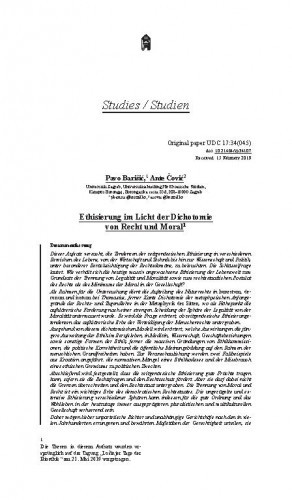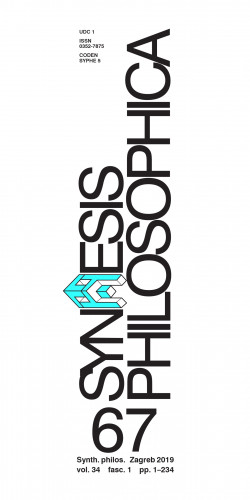Dieser Aufsatz versucht, die Tendenzen der zeitgenössischen Ethisierung in verschiedenen Bereichen des Lebens, von der Wirtschaft und Technik bis hin zur Wissenschaft und Politik, unter besonderer Berücksichtigung der Rechtsdomäne, zu beleuchten. Die Schlüsselfrage lautet: Wie verhält sich die heutige massiv angewachsene Ethisierung der Lebenswelt zum Grundsatz der Trennung von Legalität und Moralität sowie zum rechtsstaatlichen Postulat des Rechts als des Minimums der Moral in der Gesellschaft? Als Rahmen für die Untersuchung dient die Aufteilung des Naturrechts in honestum, decorum und iustum bei Thomasius, ferner Kants Dichotomie der metaphysischen Anfangsgründe der Rechts- und Tugendlehre in der Metaphysik der Sitten, wo als Höhepunkt die aufklärerische Forderung nach einer strengen Scheidung der Sphäre der Legalität von der Moralität untermauert wurde. Es wird die Frage erörtert, ob zeitgenössische Ethisierungstendenzen das aufklärerische Erbe der Verteidigung der Menschenrechte untergraben. Ausgehend von diesem dichotomischen Modell wird erörtert, welche Auswirkungen die jüngere Ausweitung der Ethik im Berufsleben, in Medizin, Wissenschaft, Geschäftsbeziehungen sowie sonstige Formen der Ethik, ferner die massiven Gründungen von Ethikkommissionen, die politische Korrektheit und die öffentliche Meinungsbildung auf den Rahmen der menschlichen Grundfreiheiten haben. Zur Veranschaulichung werden zwei Fallbeispiele aus Kroatien angeführt: die normativen Mängel eines Ethikkodexes und der Missbrauch eines ethischen Gremiums zu politischen Zwecken. Abschließend wird festgestellt, dass die zeitgenössische Ethisierung gute Früchte tragen kann, sofern sie die Rechtsfragen und den Rechtsschutz fördert. Aber sie darf dabei nicht die Grenzen überschreiten und den Rechtsstaat untergraben. Die Trennung von Moral und Recht ist ein wichtiges Erbe des demokratischen Rechtsstaates.; Članak nastoji rasvijetliti tendencije suvremene etizacije u različitim područjima života, od gospodarstva i tehnike do znanosti i politike, s posebnim naglaskom na pravnu domenu. Ključno je pitanje: kako se danas masovno nabujala etizacija svijeta života odnosi prema načelu odvajanja prava i morala te prema vladavini prava kao minimuma morala u društvu? Teoretsko je polazište za ovo razmatranje Thomasiusova podjela naravnoga prava na honestum, decorum i iustum te Kantova dihotomija metafizičkih temelja nauka o pravu i kreposti u Metafizici ćudoređa. Taj je okvir upravo vrhunac prosvjetiteljskih nastojanja za strogim odvajanjem sfere zakonitosti i moralnosti. Postavlja se u tom sklopu pitanje, potkopavaju li suvremene etičke tendencije prosvjetiteljsko naslijeđe zaštite ljudskih prava. Na temelju takva dihotomna modela dalje se raščlanjuje utjecaj nedavne ekspanzije profesionalnih, medicinskih, znanstvenih, poslovnih i drugih oblika etike, masovno uspostavljanje etičkih povjerenstava, politička korektnost i djelovanje javnoga mnijenja na okvir ljudskih temeljnih sloboda. Za ilustraciju prikazana su dva ogledna primjera iz Hrvatske – normativni nedostaci etičkoga kodeksa i zloporaba etičkoga tijela u političke svrhe. U zaključku se obrazlaže kako suvremena etizacija može donijeti dobre plodove promicanjem ćudorednih pitanja i pravne zaštite. Međutim, ona ne smije prekoračivati granice i potkopavati vladavinu prava. Razdvajanje morala i prava znatna je baština demokratske ustavne države. Neobuzdana i preobilna etizacija raznih sfera, međutim, može biti pogubna za dobro uređenje i blagostanje u suvremenom, sve više pluralističkom i multikulturnom društvu.; This paper seeks to shed light on the trends of contemporary ethicisation in various areas of life, from business and technology to science and politics, with special emphasis on the legal domain. The key question is: how does nowadays immensely enlarged ethicisation of the lifeworld relate to the principle of separating legality from morality and the rule of law as the minimum of moral in the society? Theoretical framework for this analysis is Thomasius’ division of natural law into honestum, decorum and iustum, as well as Kant’s dichotomy of the metaphysical foundations of the doctrine of law and virtue in the Metaphysics of Morals. This framework represents the pinnacle of the demand of the Enlightenment era for a separation of the spheres of legality and morality. The question is raised as to whether contemporary ethical tendencies undermine the legacy of the Enlightenment regarding the protection of the human rights. Based on this dichotomous model, the impact of the recent expansion of professional, medical, scientific, business and other forms of ethics, the massive establishment of ethics committees, political correctness, and the mediation of public opinion on the framework of human fundamental freedoms is further elaborated. By way of illustration, two exemplary case studies from Croatia are presented—the normative flaws of a code of ethics and the misuse of an ethical body for political purposes. The conclusion elaborates how contemporary ethicisation can produce good results by promoting legal issues and legal protection. However, it should not exceed the limits and undermine the rule of law. The separation of morality and law is an important legacy of the democratic constitutional state. The unbridled and extensive ethicisation of various spheres, though, can be devastating to good order and well-being in the contemporary increasingly pluralistic and multicultural society.; Cet article vise à faire la lumière sur les tendances de l’éthisation contemporaine dans divers domaines de la vie : des affaires et technologie à la science et politique, en mettant un accent particulier sur le domaine juridique. La question clé est la suivante : quel est le rapport entre l’éthisation contemporaine du monde de la vie, massivement accrue, avec le principe de la séparation entre le droit et la morale et la primauté du droit en tant que minimum de morale ? La présupposition de départ pour cette réflexion est la division par Thomasius de la loi naturelle en honestum, decorum et iustum, ainsi que la dichotomie par Kant des fondements métaphysiques de la doctrine du droit et de la vertu dans la Métaphysique des Mœurs, ledit cadre représentant le comble de l’exigence des Lumières pour une séparation stricte entre les sphères de la légalité et de la moralité. La question se pose de savoir si les tendances éthiques contemporaines nuisent l’héritage des Lumières de la protection des droits de l’homme. Sur la base de ce modèle dichotomique, une analyse plus profonde est fournie ayant pour but de démontrer l’impact de l’expansion récente des formes de l’éthique professionnelle, médicale, scientifique, des affaires et autres, de la mise en place massive des comités d’éthique, de la rectitude politique et de la médiation de l’opinion publique. A titre d’illustration, deux études sur des cas exemplaires en Croatie sont ici traitées: les faiblesses normatives d’un code d’éthique et l’abus d’un organe éthique à des fins politiques. En conclusion, il est montré que l’éthisation contemporaine peut porter ses fruits en promouvant les questions morales et la protection juridique. Cependant, elle ne doit pas dépasser les limites de le régime du droit et le nuire.
Sažetak

 Synthesis philosophica : 34,1(2019) / editor-in-chief Ante Čović.
Synthesis philosophica : 34,1(2019) / editor-in-chief Ante Čović.